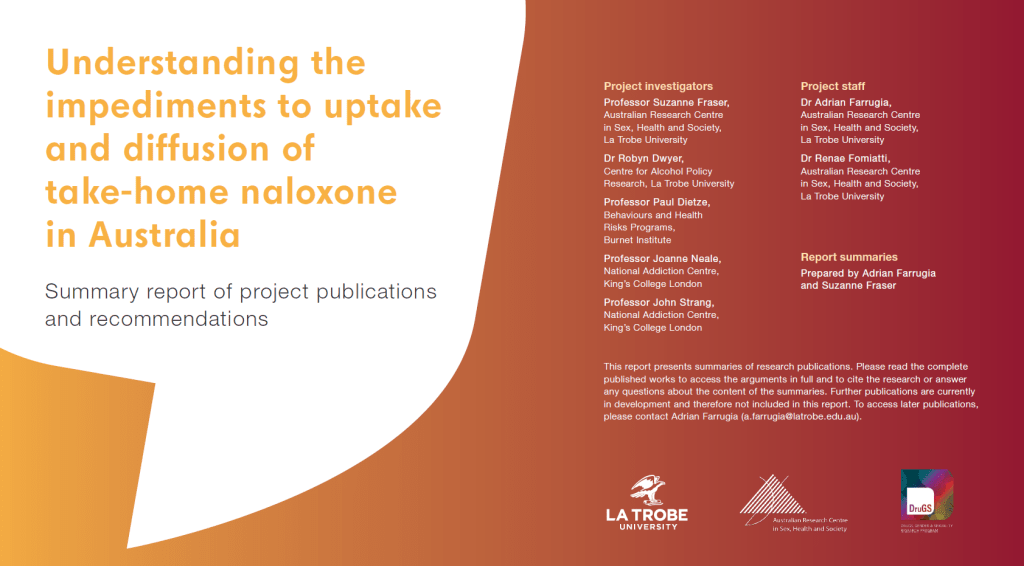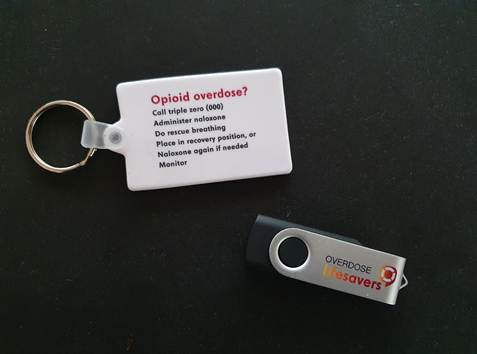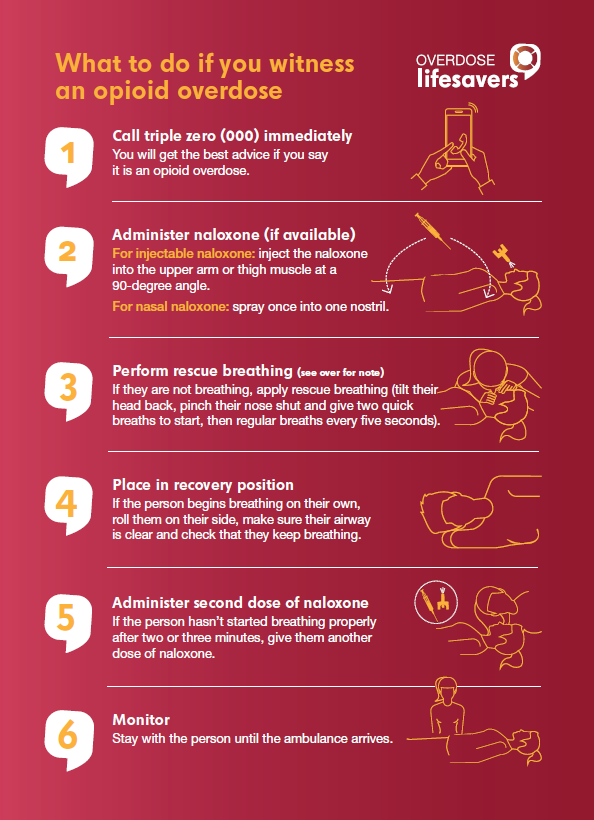The term ‘take-home naloxone’ refers to a variety of life-saving initiatives in which a medication (naloxone) is made available to non-medically trained people for administration to others experiencing an opioid overdose. Despite a range of efforts to expand these initiatives over the last decade, the uptake of take-home naloxone in Australia remains inconsistent.
This month the DruGS team launched the final report of an Australian Research Council-funded qualitative study investigating impediments to the uptake of take-home naloxone in Australia. Between 2017-2019, interviews were conducted with people who consume opioids in NSW and Victoria, some of whom had experience of using take-home naloxone, as well as relevant health professionals. These interviews gathered insights on perspectives on and experiences of naloxone, and broader issues shaping the uptake and diffusion of take-home naloxone in Australia. The report emphasises that, while participants across all groups viewed take-home naloxone as necessary and effective, it needs to be supported by broader social, institutional and legal shifts. In addition, initiatives are urgently needed to de-stigmatise opioid overdose.

The seminar, report and recommendations will be of interest to researchers and professionals working in policy, health and consumer advocacy, as well as opioid consumers and individuals with lived experience of overdose and related issues.
The event also introduced the audience to another key output from the research, Overdoselifesavers.org, Australia’s first dedicated website presenting carefully researched personal stories of opioid overdose and the use of take-home naloxone to save lives. The website seeks to look beyond the statistics to recognise that behind each death from overdose was a human life that had its own story and remains connected to the lives and stories of others.
Lead investigator Professor Suzanne Fraser explains that one of the key aims of Overdoselifesavers.org, and the team’s research on take-home naloxone more generally, is to highlight the life-saving actions of the participants:
Most members of the community don’t realise that some people who consume drugs have saved lives. We hope Overdoselifesavers.org informs professionals and the public about overdose and how to respond, and in the process goes some way to highlighting these brave actions, and helping people feel more comfortable getting naloxone and using it.
The seminar was also an opportunity for the DruGS team to officially release a collection of Overdoselifesavers.org resources. As project coordinator Dr Adrian Farrugia explained, alongside the website the project produced keyrings with backing cards summarising the steps for responding to opioid overdose, and USB drives containing the final report and recommendations for future overdose policy and practice. Importantly, these resources are available at no cost and audience members were encouraged to email Adrian to place an order (a.farrugia@latrobe.edu.au).


A recording of the full seminar is available online.
About the presenters
Professor Suzanne Fraser is Director of the Australian Research Centre in Sex, Health and Society, La Trobe University, and Visiting Professorial Fellow at the Centre for Social Research in Health at the University of New South Wales. Her research focuses on alcohol and other drug consumption, the body, gender, health and the self.
Dr Adrian Farrugia is a Research Fellow in the Drugs, Gender and Sexuality program at the Australian Research Centre in Sex, Health and Society, La Trobe University. His research specialisations include understandings of addiction and health, opioid overdose and take-home naloxone, and youth drug consumption and drug education.
Professor Paul Dietze is Director of the Program of Behaviours and Heath Risks at the Burnet Institute and Head of the National Drug Research Institute’s Melbourne office. His research focuses on patterns of alcohol and other drug use and related harms, including opioid overdose and responses.
Nyssa Ferguson is a PhD candidate at the Australian Research Centre in Sex, Health and Society, La Trobe University. Her research examines the provision of take-home naloxone and overdose prevention training in Victoria.
Jane Dicka is Drug Overdose Peer Educator, Harm Reduction Victoria, Victoria, Australia. She is an expert advisory panel member and consumer representative on this project. This research was funded by the Australian Research Council and undertaken by researchers from La Trobe University’s Australian Research Centre in Sex, Health and Society in collaboration with researchers from the Burnet Institute and King’s College, London.
This research was funded by the Australian Research Council and undertaken by researchers from La Trobe University’s Australian Research Centre in Sex, Health and Society in collaboration with researchers from the Burnet Institute and King’s College, London.



You must be logged in to post a comment.